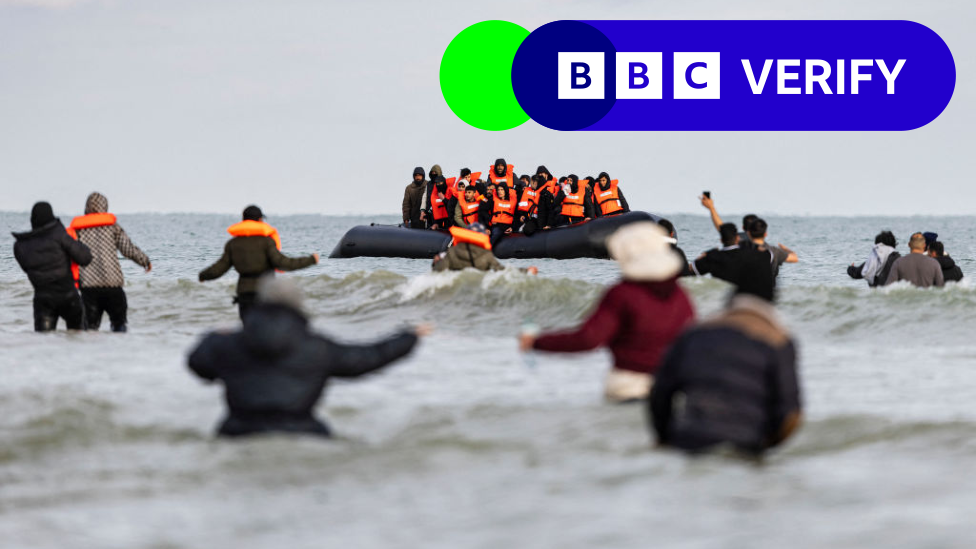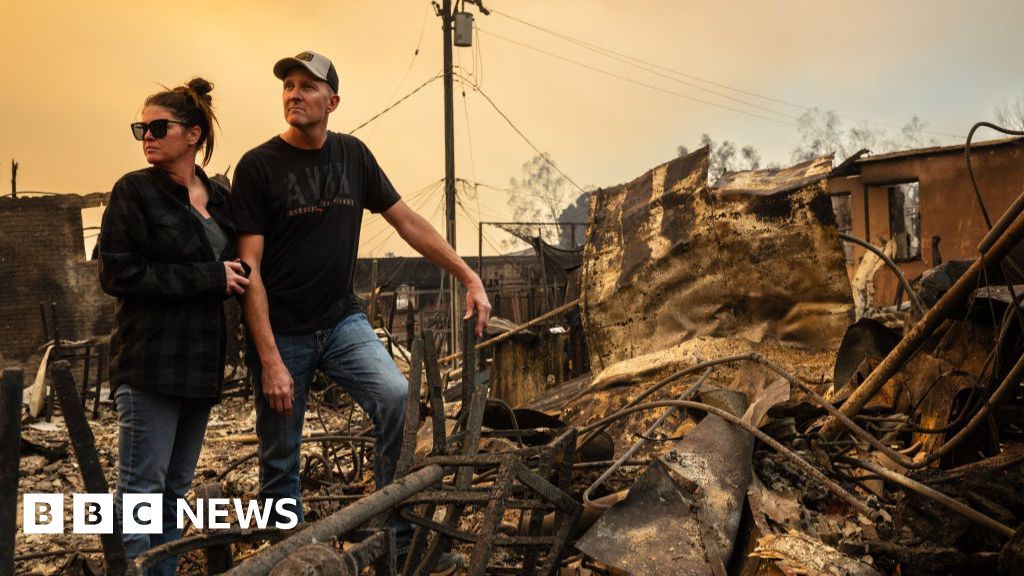 Image source, Getty Images
Image source, Getty Images
By Tamara Kovacevic & Lucy Gilder
BBC Verify
The number of people claiming asylum in Ireland has risen, with the Irish government claiming 80% have arrived from Northern Ireland.
It has blamed the Rwanda policy - the fear of deportation - for the rise, and wants to send migrants back to the UK.
Ireland's deputy leader said the 80% figure was not "data-based" but said that it was clear there was a change in where migrants had come from.
British Prime Minister Rishi Sunak says "the deterrent is... already having an impact".
BBC Verify has been looking at the rise in asylum claims in the Irish Republic and whether the Rwanda scheme is behind it.
What is happening with asylum claims in Ireland?
The 80% claim was made by Ireland's justice minister, Helen McEntee.
She told the Irish parliament that "a significant proportion of people are coming through the border now... I would say higher than 80%".
The border she was referring to is the land border between Northern Ireland and Ireland - an open border with no routine checks on people crossing it.
BBC Verify contacted the Irish government to request data to support their claim that asylum seekers are crossing into Ireland in this way but it did not provide this.
We also contacted the Irish Central Statistics Office (CSO) and the UN refugee agency (UNHCR) in Ireland.
Both replied that there are no publicly available statistics on how asylum seekers enter Ireland.
However, the Irish justice ministry told us that 91% of asylum seekers - or 6,136 of a total of 6,739 who applied for protection this year - did so at the office which deals with asylum applications, called the International Protection Office (IPO), in Dublin, rather than at a port or airport.
Image source, PA Media
Image caption,Tents housing asylum seekers near Dublin's International Protection Office
This, it says, suggests a majority of asylum seekers are entering the country via the land border, rather than by sea or air.
It said that its "firm assessment, based on the experience of staff and others working in the field, and based on the material gathered at interviews, is that in most cases those applying for the first time in the IPO have entered over the land border".
On Monday, Tánaiste (Irish deputy PM) Micheál Martin was asked for evidence that 80% of asylum seekers come via the land border.
He said: "It's not a statistical... it's not a data-based sort of evidence base, but it is very clear from the presentations when migrants come that there's a change in the nature of where migrants have come from and so on, and that's the sense and the perspective that [the Department of] Justice have on this."
The top nationality claiming asylum so far this year in Ireland is Nigerian, followed by Bangladeshi. Nigerian nationals were the top nationality in 2022 and 2023 too.
In the UK, the national breakdown is very different: Vietnamese people are the top nationality arriving by small boats so far in 2024, followed by Afghan nationals.
In Ireland, tensions have been rising over the increase in asylum seekers, with protests taking place in Dublin and other parts of Ireland.
Image source, PA Media
Image caption,Protesters at a rally in Dublin in February
Is the Rwanda policy behind the rise?
Mr Martin has blamed the UK's Rwanda policy for an increase in Ireland's asylum seeker applications. He also did so in 2022 when the Rwanda plan was at an early stage of development.
At the time, Sky News reported that the Irish Red Cross had partially blamed the Rwanda scheme for a sharp increase of asylum seekers in the first half of 2022.
But while the number of asylum seekers in Ireland has risen sharply in recent years, Mihnea Cuibus - a researcher for the Migration Observatory at the University of Oxford - says there is not enough evidence to say whether the Rwanda policy "plays a role".
He said: "The number of monthly asylum applications in Ireland rose fairly rapidly at the end of 2021 - a couple of months before the Rwanda plan was announced and has fluctuated somewhat since then.
"This indicates that the Rwanda plan wasn't responsible for driving this initial growth... many European countries, including the UK saw growth in the number of asylum applications they received over the same period."
Additional reporting by Gerry Georgieva
 (1).png)
 8 months ago
15
8 months ago
15


















